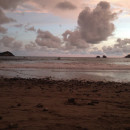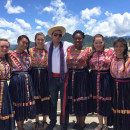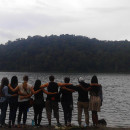Would do it all again Past Review
By A student (Duke University) - abroad from 08/16/2015 to 12/05/2015 with
CGEE: Social Change in Central America: Exploring Peace, Justice, and Community Engagement
I feel like I developed a really robust understanding of Central America as a region, due to the comparative nature of the program. I was always encouraged to reflect and think very critically about the world I live in. I also developed wonderful friends, both in my fellow students, in locals I met, and in the CGE staff. Lastly, even though this isn't the type of program where you can be gone all time time or travel to a new country every weekend, I did get to see some of the most beautiful beaches and lakes in the world. We did independent trips to Lago Atitlan, Manuel Antonio, Granada, Leon, Laguna de Apoyo, and San Juan del Sur. I got to swim and sunbathe a lot in my free time, limited as it was!
Review Photos





Personal Information
| How much international exposure did you have prior to this program? | 1 month - 6 months |
Review Your Program
|
* Overall educational experience
Academic rigor, intensity, resources, etc. |
Overall, the academics of the program were really strong. The overall academic focus is on social justice. CGE takes their "experiential learning" pedagogy really seriously, so there are many trips and speakers from different backgrounds. Students take four courses: Spanish, Religion, History/Women's Studies, and Political Science. For the latter three, most of the grading is based either on writing or on group work. Normally, I don't like group projects much, but I feel like I ended up doing some pretty cool projects and work during my group projects. |
|
* Host Country Program Administration
On-site administration of your program |
Ruth makes this program PHENOMENAL. But all of the staff - Fidel, Cesar, Elisa, Kathy, Lula, Anita, Marvin, Roberto, Milton, Mark, Fatima, and the staff at Casa Xelajú - really set this program apart. I couldn't imagine it without any of them, in a good way. |
|
* Housing:
How satisfied were you with your living arrangements? |
This program involves SEVEN homestays (three rural, four urban), for varying lengths of time. While the great majority of the time is spent in homestays, there are a few weeks spent in hotels (Guatemala), dorms (Costa Rica), and at the program's house (Nicaragua). The homestays and the diversity of the homestays make this program really special and make learning about the various countries much more robust. Some of the homestays offer very modest living conditions, while others offer more elaborate lodging. They facilitate more social integration into the various communities. Although I didn't have the opportunity to live with one family the whole semester and get really close them, I do feel close to many of the different families I stayed with. I intend to keep in touch and potentially return to visit them. |
| * Food: |
I have several food allergies (dairy, egg, beef), and I could ALWAYS find food to eat or the program had special food prepared for me. The food was delicious. Some of the host families can't offer particularly fancy food, but students were always well-fed. Additionally, Xela (in Guatemala) has some pretty wonderful, affordable restaurants to check out. |
|
* Social & Cultural Integration:
How integrated did you feel with the local culture? |
I felt most integrated in Guatemala. Xela (the host city) is very walkable, and we got to know our Spanish teachers and their friends really well. I felt like I had a strong network there by the time I left. It was hard to feel AS integrated in the other sites, but I think that each homestay and each different site helped us integrate with another social situation and another aspect of the culture. |
|
* Health Care:
How well were health issues addressed during the program? |
For smaller health concerns, the program always took care of my needs. When I wanted a medication that I couldn't find in Guatemala, Ruth (the study abroad facilitator) went to a special pharmacy to get it for me. In Nicaragua, I got quite sick (flu) and needed to go to the doctor. The doctor they took me to was more than satisfactory and was able to diagnose me correctly. Regarding malaria and other mosquito-borne illnesses: You can't take meds for Dengue or Chicungunya. Some doctors will recommend you take malaria medication in Managua, but no one in our group ended up taking them, as we had heard that the side effects were worse than the risk of malaria. (My dad did take the pills for a week when he visited me and had no adverse effects.) |
| * Safety: |
I felt very safe. My host families were super conscious of safety and would walk with me both to school in the morning and if I was going anywhere at night. |
| If you could do it all over again would you choose the same program? |
Yes
|
Finances
|
* Money: How easily were you able to live on a student's budget?
(1 = not very easy/$200+ on food & personal expenses/week, 2.5 = $100/week, 5 = very easily/minimal cost) |
|
| Do you have any general money-saving tips for future study abroad participants? | Costa Rica is, by far, the most expensive country. Be careful not to blow all of your money there. If you're worried about saving money on fall break, don't stay in Costa Rica - go to Panama or Nicaragua. |
Language
| * Did your program have a foreign language component? | Yes |
|
How much did the program encourage you to use the language?
0 = No encouragement, 5 = frequent encouragement to use the language |
HUGE encouragement to use the language in Costa Rica, but not as much in the other countries. That said, we were in homestays for the vast majority of the time, so that really forces you to use and practice the language. The program only requires one semester of Spanish to apply, so all the coursework (aside from Spanish) must be done in English, and all the speakers are translated. I do feel like my language skills really developed, but it depends on the person and how committed you are. I tried hard, but I could always have tried harder. |
Other Program Information
|
* Where did you live?
Select all that apply |
|
|
* Who did you live with?
Select all that apply |
|
|
* Who did you take classes with?
Select all that apply |
|
| About how many local friends did you make that you will likely keep in touch with? |
A Look Back
| * What did you like most about the program? |
|
| * What could be improved? |
|
| * What do you know now that you wish you knew before going on this program? | Don't bother bringing a lot of shorts - it's generally not culturally appropriate to wear them, especially to speakers. Instead, bring nice skirts or sundresses. |
Reasons For Studying Abroad
| To help future students find programs attended by like-minded individuals, please choose the profile that most closely represents you. |
The Academic or LinguistYou went abroad with specific academic goals in mind; the program credentials and rigor of your coursework abroad were very important to you. You had a great time abroad, but never lost sight of your studies and (if applicable) were diligent with your foreign language study. Good for you! |








